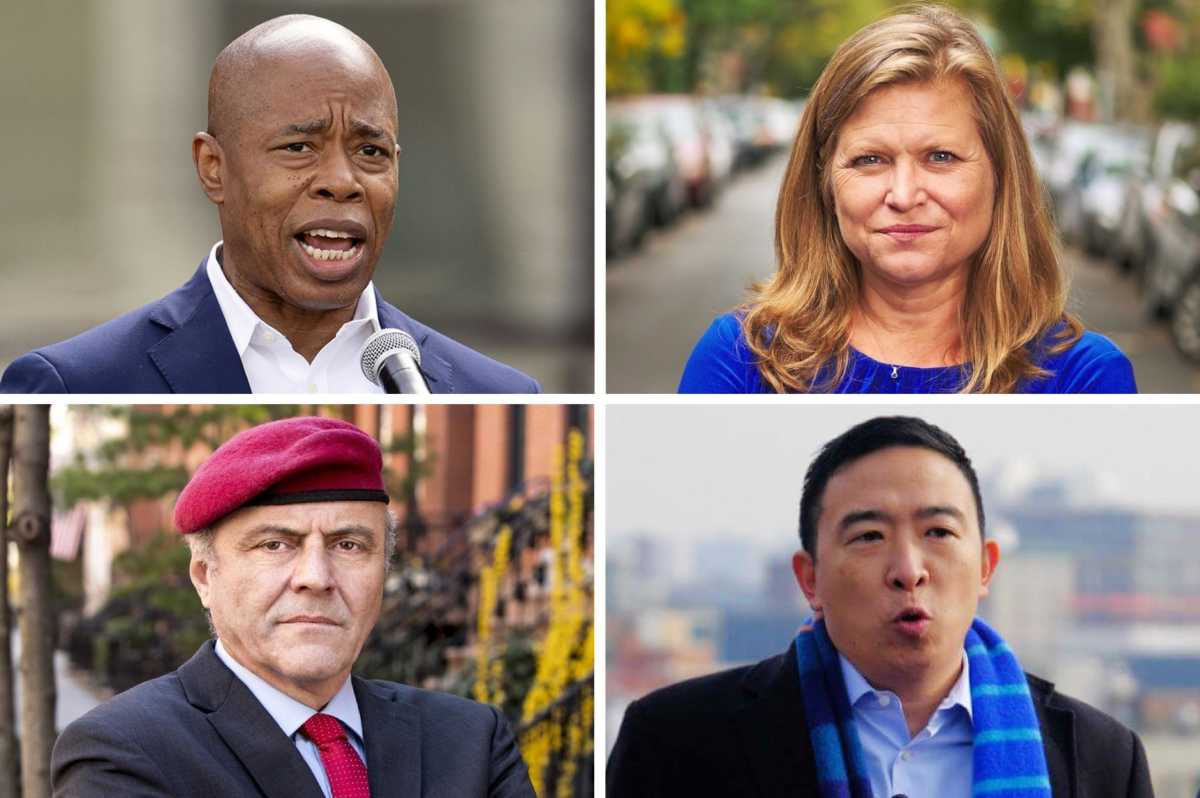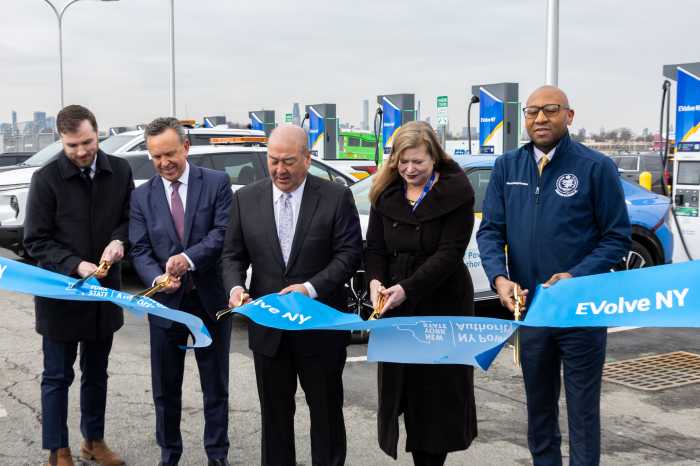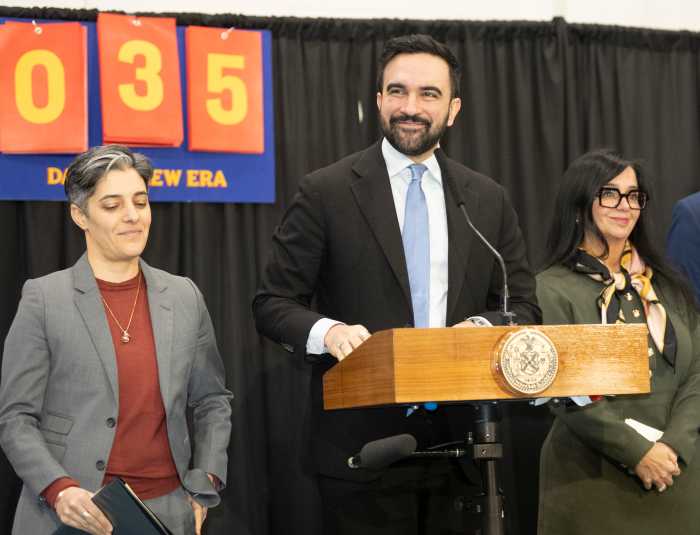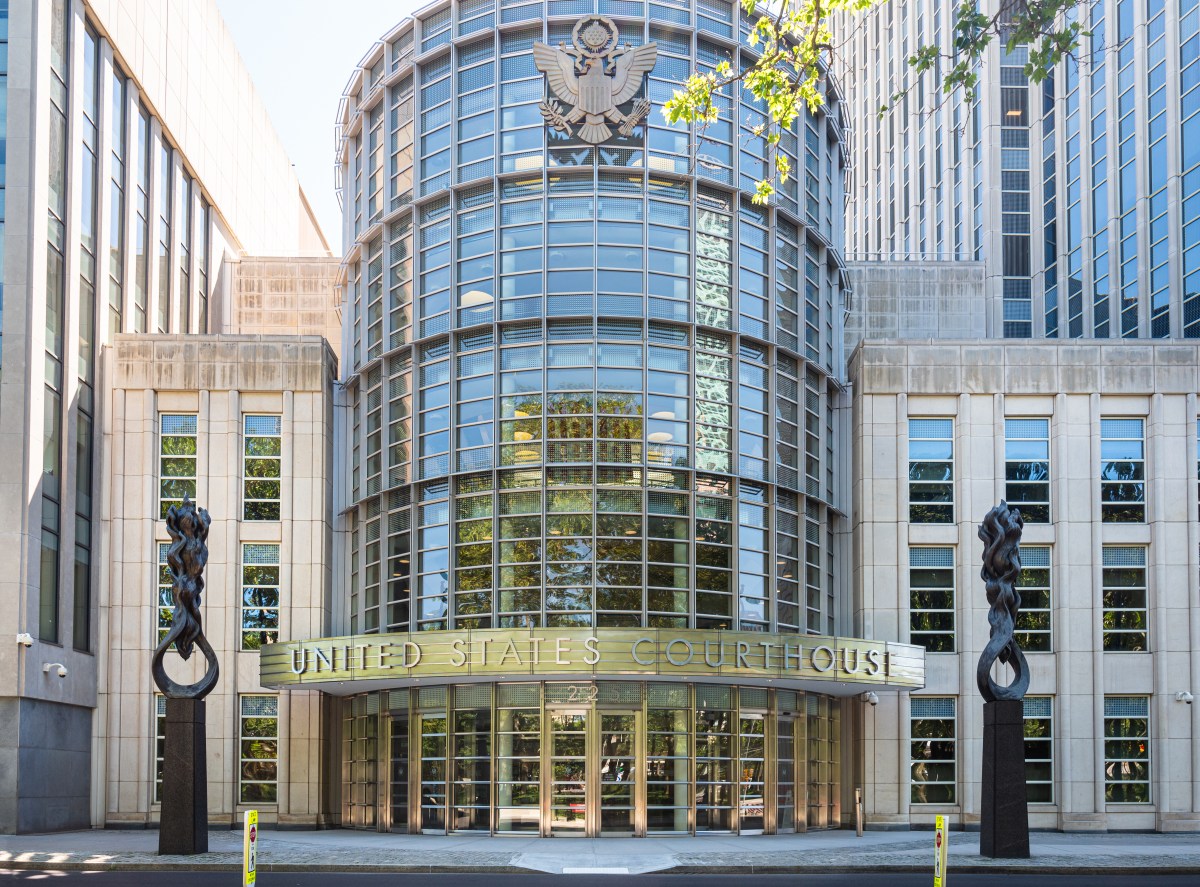Four New York City mayoral candidates answered questions Thursday, June 3, at a forum focused on crime, education and zoning in Ridgewood as they near the June 22 primaries.
Three Democratic candidates participated in the forum: Andrew Yang, a former 2020 presidential candidate; Eric Adams, the Brooklyn borough president; and Kathryn Garcia, former New York City sanitation commissioner. The only Republican candidate in attendance was Curtis Sliwa, founder of the Guardian Angels, a group of volunteers who patrol subways.
Charles Ober of the Ridgewood Property Owners & Civic Association Inc. and Kevin Forrestal of the Queens Civic Congress moderated the forum over Zoom.
Here are some of the questions the candidates were asked and their answers. Some answers have been condensed for space and length:
What is your plan on day one to address both street and subway crime, which has skyrocketed in just five months by 70 percent? What will you do with police staff levels that will possibly affect enforcement in a positive direction, how long will it take you to turn around this crime wave so we can feel safe again?
Sliwa: “To get a dedicated property tax to hire 3,000 additional cops and train them is going to take a bit of time. But in the interim, you have to put the street crime unit back into effect. You have to put the homeless outreach unit back into the mix because they’re going to be a danger to themselves and everyone else.”
Adams: “The prerequisite to prosperity is public safety. We have to zero-in on gun violence. I’m going to put more resources in the gun suppression unit, partner with district attorneys so we can get a special prosecutor for guns and gangs. I’m going to move my officers out of clerical duty, put them on patrol where they should be and make sure they’re focusing on some of the street crime and the quality-of-life issues we’re facing. With the subway system, if we don’t get our trains safe, we are not going to have the economic turnaround that we deserve. We’re going to reinstall the homeless outreach unit with the police and partner them with mental health professionals.”
Yang: “I believe we can see progress in three to six months. The staffing level is one issue. Defunding the police is the wrong approach for NYC. We need to get more officers, not fewer. You need to have full-time cops [in the subways] not just during rush hour. Officers need to get on the subway and do visual inspections. We need to increase detectives both at the precinct level and at the gun violence suppression division to get the clearance rate up.”
Garcia: “We have seen an enormous spike in gun violence. We need to make sure the gun suppression unit is fully funded because we have a very low clearance rate right now. We need to do gun buybacks. When you think about street and subway crime, we have seen a lot of hate crime. We need to see patrol officers, they need to be in our neighborhoods, meeting with our businesses, getting to know people, so that they have a real connection to their communities. We need not only patrol officers but mental health professionals.”
What changes will you bring to public schools to make sure all students are prepared to succeed in the real world?
Adams: “We have to stop schooling and start education. We need to do dyslexia screening in every school so that we won’t put our children on a pathway of feeling that they can’t learn and take on criminal behavior. Number two, we have to put the right technology in all our schools. Number three, every child that needs a tutor, we will make sure they have a tutor. We’re going to look at extending school hours and summer months. We’re going to have one of the best remote learning opportunities during the summer months, give our students structured assignments, so we don’t have the summer slide that we see every year. We’re also going to partner with our companies and corporations to help craft a curriculum and build out vocational training.”
Sliwa: “They’re teaching this racist theory. Critical waste theory — in which white people have to acknowledge that they are beneficiaries of white privilege, they have to prove to everyone else that they’re worthy to be in their company. This [theory] is going to end because there’s mayoral control. And I’m going to flush out the bureaucrats at the Department of Education, the acronym stands for dumbest organization ever.”
Yang: “We have to get our schools open, and get our kids back and then we have to assess just how bad the learning loss and damage are for many of them. We have to give our principals a higher degree of autonomy to do what’s best for our kids. We also have to stop pretending that everyone’s going to go to college. We have to invest very heavily in year-round employment opportunities, co-ops [and] vocational training.”
Garcia: “We have to equally fund our public schools. We also need to make sure we screen for dyslexia, so we can make the approach to their education what they need so we don’t just pass them hoping that it works itself out. Using a reading literacy program that is designed to help kids read by the time they are in third grade — if we screw up that beginning piece, we’re playing catch up the whole time. The model of early college [is very important], where we’re pushing high school kids to be taking college-level courses. Bard Early College needs to expand.”
Given current bail reform and COVID releases, and with the detention levels greater than the planned jail capacity of the proposed borough jails, what is your plan to address the citywide shortage of detention facilities?
Sliwa: “Well, if you keep Rikers Island open and the barge off of Hunts Point, you have more than enough capacity. I’m the only candidate who has not only lectured on Rikers Island, done a radio program on Rikers Island, I’ve been locked up on Rikers Island when the city was opposed to the Guardian Angels. There’s more than enough space, and I’m going to give special attention to correctional officers who each day are getting assaulted, stabbed [and] slashed. I’m going to put them on a pedestal where they’ve never been put before.”
Adams: “There isn’t a shortage; we made the determination via bail reform and letting people out due to COVID. It’s imperative for those who are carrying out serious acts of violence — they should be held in with bail. And there are far too many judges that are not giving bail even on cases when they are allowed to give bail, and that is extremely problematic. We need to reexamine the bail reform bill in Albany.”
Yang: “I think we need to reexamine the borough-based jail plans as they’re written. It seems like many are going to dominate the neighborhoods they’re in. If we’re going to be building these jails, we don’t need to make it a towering monolith. We can build two or three structures closer to the ground.”
Garcia: “I do believe in closing Rikers because I don’t think it’s fixable. We also need to get the court system moving. We’re not getting through the court system quickly enough so that you don’t end up in Rikers, you end up in either supervised release or a drug treatment program. It saves us a ton of money. Every person on Rikers costs us more than $400,000 a year.”
The overwhelming number of Queens community boards have voted against Council Speaker Johnson’s Planning Together proposal. This proposed legislation calls for up-zoning, what is your view?
Sliwa: “What does Corey Johnson know? He lives in Chelsea. They’re all high risers. There’s no residential housing. But you go through areas throughout Queens […] there is one-family, two-family homes, and all the sudden they want to put a five-story monstrosity there. No, you keep the residential flavor of the neighborhood.”
Adams: “I am a big community board person. I believe in the local government and the local input. I do not support Corey’s proposal.”
Yang: “I’m very sensitive to both sides of this, where obviously activists and leaders know your neighborhoods best and we should be listening to your guidance on how we should proceed. On the flip side, we all know there’s a massive affordable housing crisis. This is going to be a constant tug-of-war. We need to try and achieve citywide goals in a way that’s sensitive to community concerns. I want to find middle-ground solutions.”
Garcia: “I’ve been resistant to the speaker’s approach. When we think about zoning, there are ways to do it like in my neighborhood. What they did during the Bloomberg administration was they down-zoned midblock and up-zoned an avenue. So the neighborhood retained its character.”
To view the full forum, see the recorded video on YouTube.


































